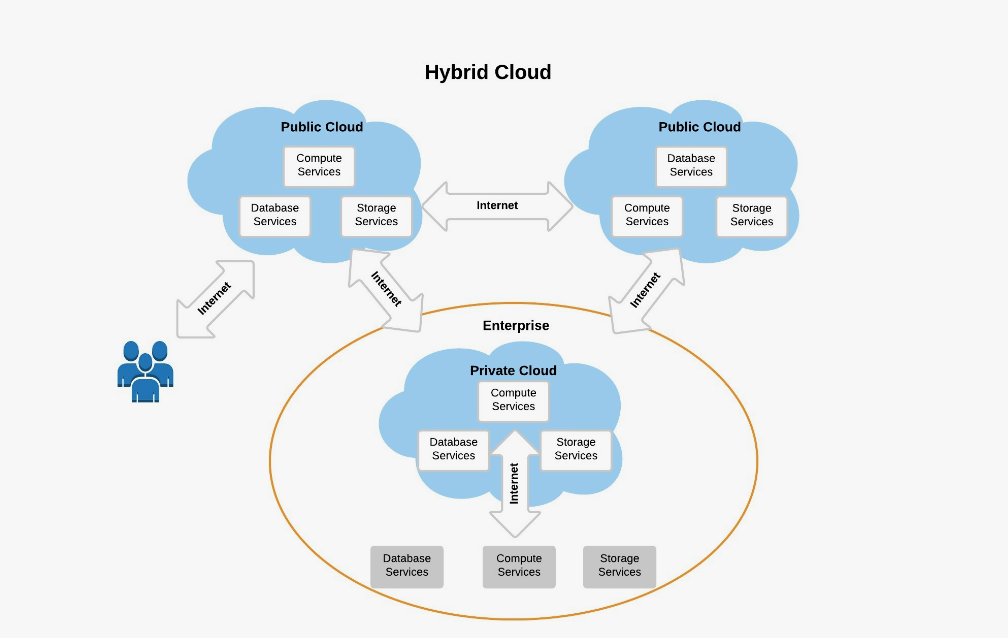Businesses are constantly evolving to meet the growing demands for faster, more flexible computing solutions. One of the most significant technological shifts in recent years is the rise of hybrid cloud computing.
But what does this trend mean for you?
Whether you’re running a small business, managing a large enterprise, or simply interested in how technology is changing, understanding hybrid cloud and its benefits is essential.
Why is Hybrid Cloud Gaining Popularity?
Hybrid cloud is coming into the mainstream because of several factors that directly benefit organizations and individuals. Here’s why it’s becoming such a big deal:
- Cost Efficiency – A hybrid cloud enables enterprises to archive some data and applications in the public cloud. This reduces the cost of maintaining physical infrastructure. It is a pay-as-you-go model, meaning that only those business resources required at a given time are paid for, enhancing cost management.
- Flexibility and Scalability – Hybrid cloud scales up and down the resources on demand. This becomes very helpful during periods when some peaks occur, like product launches or holiday seasons, which cause a spike in visitors. You can use public cloud services temporarily without making a permanent investment in new infrastructure.
- Improved Security and Compliance – A hybrid cloud is a way forward for businesses dealing with sensitive information or those that are highly regulated. Organizations can store sensitive data on private clouds with strong security, leaving other data to be handled by the public cloud which also takes care of its security pretty well.
- Business Continuity and Disaster Recovery– The hybrid cloud provides an excellent backup solution for achieving business continuity. In the event one part of your cloud infrastructure goes down, you can count on another part to keep on running without interruption.
- Innovation and Agility – The hybrid cloud enables companies to experiment and innovate faster. With the ability to quickly scale infrastructure and access a vast array of services, businesses can develop and test new ideas much faster than ever before.
How Hybrid Cloud Impacts Businesses
Hybrid is a ground-up shift that changes how IT infrastructures are viewed. This is how adopting a hybrid cloud impacts on your business:
- Simplified IT Management – Hybrid cloud environments are easier to manage sometimes compared to the traditional infrastructure for IT. Management tools and dashboards are provided by cloud service providers that help to oversee both private and public cloud systems in one location, making it easier to manage workload and monitor performance.
- Enhanced Collaboration – The hybrid cloud enables teams to access and share resources from anywhere across different locations with ease. It fosters collaboration, particularly for distributed teams.
- Speeding Up Time-to-Market – Hybrid cloud accelerates the building and delivery of products since this model gives businesses easy access to large resources. It accelerates processes by providing teams with computing power whenever needed, eliminating the need for waiting for a physical server or additional IT infrastructure.
- Cost Control – The Hybrid cloud offers the ability to dynamically allocate the resources of the businesses. This means saving money as it can store the non-sensitive data in the public cloud and is left to all expensive, more critical operations in private clouds. That helps balance cost control with performance needs.
- Better Customer Experience – Hybrid cloud improves the customer experience since it provides fast and reliable services. Cloud platforms outperform on-premise IT infrastructure, leading to better uptime and superior performance.
How Hybrid Cloud Can Benefit You as an Individual
You may be wondering how the hybrid cloud impacts your lives directly. Even if you are not running a business or doing IT work, there are indirect benefits that you can experience in your daily life.
- Better Service from Online Platforms – Hybrid cloud technology ensures that hybrid offerings have the potential to help smooth and infinite runs in terms of operations as far as operations are concerned.
- More Personalized Experiences– A hybrid cloud allows businesses to collect and analyze data more efficiently, with a higher likelihood of offering personalized services. That means, you can get more tailored recommendations from your favourite e-commerce sites or more relevant content from streaming services.
- More Reliable Cloud Storage Options – In a hybrid cloud, there is redundancy and faster retrieval of your pictures, videos, and any other important files you save in the cloud. You have the choice of taking advantage of private or public cloud. Therefore, your data is more secure and available on different devices without sacrificing security.
Conclusion
The rise of the hybrid cloud is a game-changer.
For businesses, it’s a powerful tool that offers flexibility, cost efficiency, and better security. For individuals, it means faster, more reliable services with greater personalization.
As the hybrid cloud continues to evolve, we can look forward to even more innovative ways it shapes our digital experiences, making both work and personal life easier, faster, and more connected.
The future of computing is hybrid, and it’s here to stay!
Read More: Why Choose a Rack Server Over Cloud Solutions

